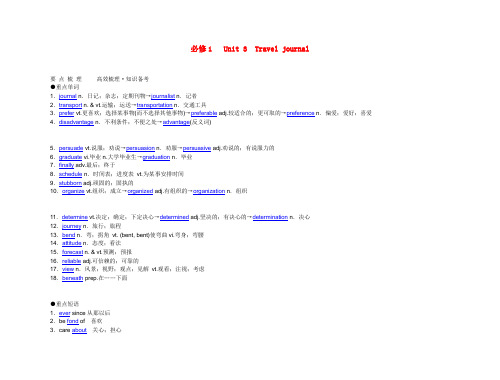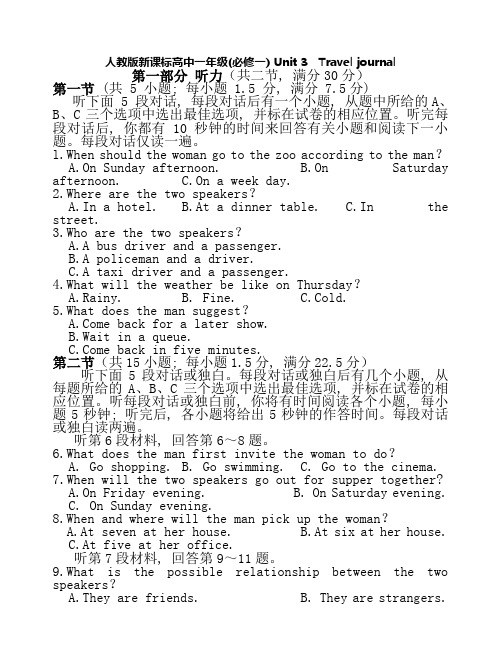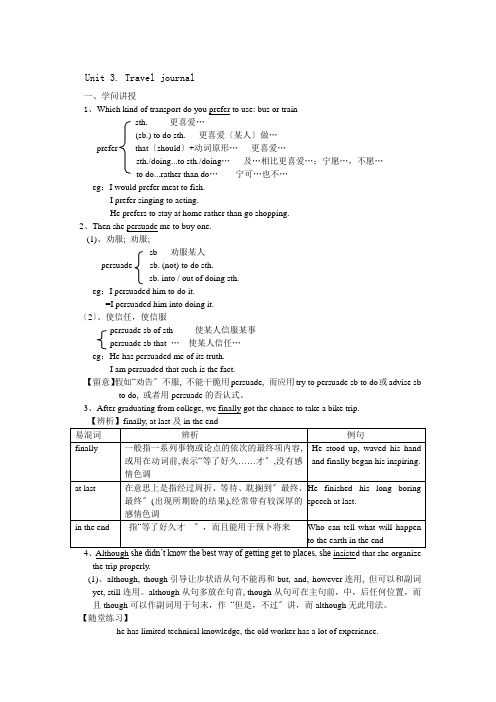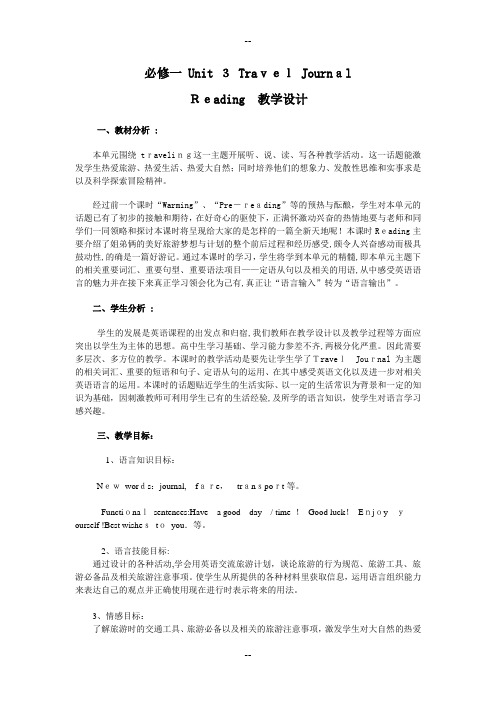2017--2018学年人教版必修一unit 3 Travel Journal grammar学案 (1)
2017-2018学年人教版必修一Unit3traveljournal-usinglanguage课件(42张PPT)

新课讲解 教学目
标
The possible answers:
8. Why does Zhang Sha use the words special day on the last line in the letter of the invitation? Zhang Sha use the words special day on the last line in the letter of the invitation because this is the day earthquake happened thirtytwo years ago.
新课讲解 教学目
标
A letter of the invitation
Read the letter of the invitation quickly first, then work in pairs and answer the following questions. 5. When will the new park open? 6. Why will the City Government open the new park? 7. Who else are invited to attend the opening ceremony of the park? 8. Why does Zhang Sha use the words special day on the last line in the letter of the invitation?
导入新课 教学目
Answer these questions 1. Have you ever attended an English speech competition? 2. What's your topic of your speech? 3. Where did you participate in the speech competition? 4. I suppose you have won the competition, didn't you? 5. What's your opinion about the Self rescue after disaster?
高中英语必修一Unit-3-Travel-journal知识点

stop doing 停止做某事16. as usual 像平常一样17. so…that 如此… 以至于…So + adj + a/an + n. + thatSuch + a/an +adj. + n. + that18. be familiar with 对…熟识(人作主语)be familiar to 为…所熟识(物作主语)二、学问要点1. Which kind of transport do you prefer to use: bus or train?prefer v.更宠爱;选择某事物(而不选择其他事物)(1)prefer sth.更宠爱……prefer (sb.) to do sth.更宠爱(某人)做……prefer that更宠爱[that从句中常用(should)+动词原形]prefer sth./doing...to sth./doing...与……相比更宠爱……;宁愿……,不愿……e.g. I would prefer meat to fish.我宠爱肉赛过(宠爱)鱼。
I prefer singing to acting. 我宠爱唱歌赛过演戏。
prefer to do...rather than do...宁可……也不……e.g. He prefers to stay at home rather than go shopping.他宁可呆在家里也不情愿去逛商店。
(2)preference n. 偏爱;爱好;宠爱give preference to sb./sth.给……以实惠;优待2. Then she persuade me to buy one.然后她动员我也买了一辆.persuade vt.劝服; 劝服; vi.被劝服persuade sb. (not) to do sth.persuade sb. into / out of doing sth.e.g. I persuaded him to do it. = persuade him into doing it.我已劝服他做这件事。
2018版高中英语人教版必修1:Unit 3 Travel journal 课件

高中·英语
People travel by train, by plane, by boat and by car.All
means of travel have their advantages and disadvantages.And
people choose one according to their plans and destinations. If we are fond of travelling, we will see and learn a lot of things that we can never see or learn at home, though we may read about them in books and newspapers, and see pictures of them on TV.The best way to study geography is to travel, and the best way to get to know and understand people is to meet them in their own homes.
• Part 4 Writing
• 重点回顾
高中·英语
Unit 3
Travel journal
高中·英语
主题语境·导入
旅游无疑是人一生中的一种最振奋人心的经历之一。它对某些人来 说也许是一种消遣,但事实上,任何人都可以并应当去旅行。
Millions of people all over the world spend their holidays travelling.They travel to see other countries and continents, modern cities and the ruins of ancient tombs;they travel to enjoy particular places, or just for a change of scene.It’s always interesting to discover new things, different ways of life, to meet different people, to try different food and to listen to different music.
高考英语 unit 3 travel journa要点梳理+重点突破 新人教版必修1

必修1 Unit 3 Travel journal要点梳理高效梳理·知识备考●重点单词1.journal n.日记;杂志;定期刊物→journalist n.记者2.transport n. & vt.运输;运送→transportation n.交通工具3.prefer vt.更喜欢;选择某事物(而不选择其他事物)→preferable adj.较适合的;更可取的→preference n.偏爱;爱好;喜爱4.disadvantage n.不利条件;不便之处→advantage(反义词)5.persuade vt.说服;劝说→persuasion n.劝服→persuasive adj.劝说的;有说服力的6.graduate vi.毕业n.大学毕业生→graduation n.毕业7.finally adv.最后;终于8.schedule n.时间表;进度表vt.为某事安排时间9.stubborn adj.顽固的;固执的10.organize vt.组织;成立→organized adj.有组织的→organization n.组织11.determine vt.决定;确定;下定决心→determined adj.坚决的;有决心的→determination n.决心12.journey n.旅行;旅程13.bend n.弯;拐角vt. (bent, bent)使弯曲vi.弯身;弯腰14.attitude n.态度;看法15.forecast n. & vt.预测;预报16.reliable adj.可信赖的;可靠的17.view n.风景;视野;观点;见解vt.观看;注视;考虑18.beneath prep.在……下面●重点短语1.ever since从那以后2.be fond of 喜欢3.care about关心;担心4.change one’s mind改变主意5.make up one’s mind 下定决心6.give in(to) 投降;屈服7.as usual 通常;照常8.at midnight 在午夜9.dream about doing 梦想干某事10.graduate from从……毕业11.at an altitude of 在……高度12.put up a tent 搭起帐篷13.for one thing,...for another 一方面,……另一方面14.can’t/can hardly wait to do sth. 迫不及待地干某事●重点句型1.Ever since middle school, my sister Wang Wei and I have dreamed about taking a great bike trip.从高中起,我姐姐王薇和我就一直梦想作一次伟大的自行车旅行。
人教版新课标高中一年级必修一Unit3Traveljourna含答案解析及听力mp3

人教版新课标高中一年级(必修一) Unit 3 Travel journal第一部分听力(共二节, 满分30分)第一节 (共 5 小题; 每小题 1.5 分, 满分 7.5分)听下面 5 段对话, 每段对话后有一个小题, 从题中所给的A、B、C三个选项中选出最佳选项, 并标在试卷的相应位置。
听完每段对话后, 你都有 10 秒钟的时间来回答有关小题和阅读下一小题。
每段对话仅读一遍。
l.When should the woman go to the zoo according to the man?A.On Sunday afternoon.B.On Saturday afternoon.C.On a week day.2.Where are the two speakers?A.In a hotel.B.At a dinner table.C.In the street.3.Who are the two speakers?A.A bus driver and a passenger.B.A policeman and a driver.C.A taxi driver and a passenger.4.What will the weather be like on Thursday?A.Rainy.B. Fine.C.Cold.5.What does the man suggest?e back for a later show.B.Wait in a queue.e back in five minutes.第二节(共15小题; 每小题1.5分, 满分22.5分)听下面5段对话或独白。
每段对话或独白后有几个小题, 从每题所给的A、B、C三个选项中选出最佳选项, 并标在试卷的相应位置。
听每段对话或独白前, 你将有时间阅读各个小题, 每小题5秒钟; 听完后, 各小题将给出5秒钟的作答时间。
每段对话或独白读两遍。
Unit3 Travel journal 课件(新人教版必修1)

(3)try to persuade sb.to do sth.= advise sb.to do sth.
尽力劝说某人做某事(但未必劝服)
[教材P18原句]
Two years ago she bought an expensive
mountain bike and then she persuaded me to buy one. 两年前,她买了一辆昂贵的山地车,然后说服我也买了一辆。 ①He's so stubborn that I'm afraid I can't persuade him to change his mind. 他那么固执,我怕我说服不了他改变主意。
4.We can hardly wait to see them! 我们迫不及待地想要见到他们。
解读:can hardly wait to do sth./for sth.= cannot wait to do
sth./for sth. “迫不及待地要做某事;急切地做某事”。
仿写:经过长期的战乱之后,利比亚人民迫不及待地想过
上平静的生活。
The people of Libya _______________ after a long war. 答案:could hardly/couldn't wait to live a peaceful life
1.prefer vt.更喜欢;选择某事物(而不选择其他事物) (1)prefer sth. to sth. prefer doing to doing (2)prefer (sb.) to do sth. 喜欢„„而不喜欢„„ 宁愿„„而不愿„„ 更喜欢(某人)做„„
Ⅲ.经典句型必会 1.Although she didn't know the best way of getting to
人教版高一英语必修一Unit3Traveljournal知识点详解和练习试卷1

Unit 3. Travel journal一、学问讲授1、Which kind of transport do you prefer to use: bus or trainsth. 更喜爱…(sb.) to do sth. 更喜爱〔某人〕做…prefer that 〔should 〕+动词原形… 更喜爱…sth./doing...to sth./doing … 及…相比更喜爱…;宁愿…,不愿…to do...rather than do … 宁可…也不…eg :I would prefer meat to fish.I prefer singing to acting.He prefers to stay at home rather than go shopping.2、Then she persuade me to buy one.(1)、劝服; 劝服;sb 劝服某人persuade sb. (not) to do sth.sb. into / out of doing sth.eg :I persuaded him to do it.=I persuaded him into doing it.〔2〕、使信任,使信服persuade sb of sth 使某人信服某事persuade sb that … 使某人信任…eg :He has persuaded me of its truth.I am persuaded that such is the fact.【留意】假如“劝告〞不服, 不能干脆用persuade, 而应用try to persuade sb to do 或advise sbto do, 或者用persuade 的否认式。
3、After graduating from college, we finally got the chance to take a bike trip.、Although she didn’t know the best way of getting get to places, she insisted that she organize the trip properly.(1)、although, though 引导让步状语从句不能再和but, and, however 连用, 但可以和副词yet, still 连用。
必修一Unit-3-Travel-Journal教学设计

必修一 Unit 3Travel JournalReading 教学设计一、教材分析 :本单元围绕traveling这一主题开展听、说、读、写各种教学活动。
这一话题能激发学生热爱旅游、热爱生活、热爱大自然;同时培养他们的想象力、发散性思维和实事求是以及科学探索冒险精神。
经过前一个课时“Warming”、“Pre-reading”等的预热与酝酿,学生对本单元的话题已有了初步的接触和期待,在好奇心的驱使下,正满怀激动兴奋的热情地要与老师和同学们一同领略和探讨本课时将呈现给大家的是怎样的一篇全新天地呢!本课时Reading主要介绍了姐弟俩的美好旅游梦想与计划的整个前后过程和经历感受,颇令人兴奋感动而极具鼓动性,的确是一篇好游记。
通过本课时的学习,学生将学到本单元的精髓,即本单元主题下的相关重要词汇、重要句型、重要语法项目——定语从句以及相关的用语,从中感受英语语言的魅力并在接下来真正学习领会化为己有,真正让“语言输入”转为“语言输出”。
二、学生分析 :学生的发展是英语课程的出发点和归宿,我们教师在教学设计以及教学过程等方面应突出以学生为主体的思想。
高中生学习基础、学习能力参差不齐,两极分化严重。
因此需要多层次、多方位的教学。
本课时的教学活动是要先让学生学了TravelJournal为主题的相关词汇、重要的短语和句子、定语从句的运用、在其中感受英语文化以及进一步对相关英语语言的运用。
本课时的话题贴近学生的生活实际、以一定的生活常识为背景和一定的知识为基础,因刺激教师可利用学生已有的生活经验,及所学的语言知识,使学生对语言学习感兴趣。
三、教学目标:1、语言知识目标:Newwords:journal,fare,transport等。
Functionalsentences:Have a good day/ time !Good luck!Enjoyyourself !Best wishestoyou.等。
2、语言技能目标:通过设计的各种活动,学会用英语交流旅游计划,谈论旅游的行为规范、旅游工具、旅游必备品及相关旅游注意事项。
2017-2018学年人教版必修一Unit3traveljournal-reading课件(共21张PPT)

journal This is a travel _______________.
Wang Wei dream of taking a great bike Wang Kun and _____________’s ideas trip, but they have different _____________. They are preparing
Advantage cheaper than the airplane provides accommodation and meals … ship Disadvantages more expensive than the train or bus not convenient for visiting inland places …
Paragraph 2
1. What kind of person is Wangwei?
She is very stubborn.
2. Can you find some words to describe the feelings of Wang Wei about the trip?
determined, excited, interested
paragraph.
Please read the first paragraph and answer the following questions.
Paragraph 1
Qestion 1
How many people are there going for the trip?
Four. They are Wang Kun’s cousins What was their dream?
trip for the ____________.
2018学年度人教版必修一Unit 3Travel journal Period1Reading课件(98张)

返回导航
Unit 3 Travel journal
Ⅰ.单词速记 journal 1.__________( n.)日记;杂志;定期刊物 transport 2.__________( n.)运送;运输 prefer 3.__________( vt.)更喜欢;选择某事物(而不选择其他事物) fare 4.__________( n.)费用 finally 5.__________( adv.)最后;终于 schedule 6.__________( n.)时间表;进度表 (vt.)为某事安排时间
返回导航
Unit 3 Travel journal
Ⅱ.补全短语 1.ever __________ 自从 since
2.be __________ of 喜欢 fond
about 3.care __________ 关心;忧虑;惦念 4.change one's __________ 改变主意 mind up 5.make __________ one's mind 下决心 in 6.give __________ 投降;屈服;让步 through 流经 7.flow __________ about of 梦想 8.dream __________ 9.graduate __________ 从„„毕业 from
10.__________ an altitude of... 以„„高度 at
返回导航
Unit 3 Travel journal
Ⅲ.课文理解 First 略读主旨 1.Match the general idea of every paragraph. B Para.1 __________ C Para.2 __________ A Para.3 __________
高中英语必修一(新课标人教版)课文课件 Unit 3 Travel journal

一、核心单词 1. prefer [pri'fə:] v. (preferred/preferring) 更喜欢;选择某事 (1) I prefer dogs to cats. 猫狗之中我更喜欢狗。 (2) I prefer speaking the truth to lying. 我宁愿讲实话而不愿说谎。 归纳: 归纳: prefer doing sth to doing sth. 更喜欢做某事 prefer A to B 与B比更喜欢A prefer to do sth. 宁愿做某事 prefer to do sth. rather than do sth. 宁愿做某事而不做 某事
三、课文回顾 Wang Kun and Wang Wei have dreamed about taking a great bike trip 1 since middle school. After 2 graduating (graduate) from college, they finally got the chance to take a bike trip. It was Wang Wei 3 who/ that first had the idea to cycle along the entire Mekong River from 4 where it begins to where it ends. Wang Kun said she was fond of his sister 5 but she was really stubborn. Although she didn’t know the best way of getting to places, she insisted that she 6 (should) organize (organize) the trip properly. Wang Kun kept asking her
英语人教必修一Unit-3-Travel-Journal-【教学设计】

Unit 3 Travel Journal教材分析本单元的话题是旅游,学生对此话题较为熟悉,应该有较浓厚的兴趣。
整个单元讲述的是主人公“王坤”以旅行日记的形式详细地记录自己沿着湄公河而下的自行车旅行。
学生通过追随作者的旅行,学习及探讨与旅游相关话题和内容,如:了解旅游常识,如何设计旅行计划,如何为旅行做准备,旅行的意义等。
通过本单元的学习,学生不仅能掌握与旅游及地理相关的主题词汇,理解和运用现在进行时表示将来的语法项目,还会通过探讨旅游话题了解世界各地的文化,增强对祖国河山的热爱和国际意识,进而开拓学生思路,培养学生的跨文化交际能力。
Warming up 部分先让学生分享国庆假期的游玩经历,引导学生探讨节假日旅行的利与弊。
通过对比分析几种常见交通方式的利弊,择优选择自己旅行的最佳出行方式,并尝试为自己设计旅行计划。
Reading部分先通过Pre-reading的问题,引导学生关注世界各大河流及人类对河流的利用,和理解湄公河在东南亚的地位及对东南亚各国人民的重要作用。
课文主要介绍了主人公王坤和王薇的梦想及骑自行车沿着湄公河旅行的计划和准备。
在整体理解课文主要内容后重点引导学生分析王坤和王薇两位主人公的性格及对旅行的不同态度。
Learning about Language以文本核心单词与词组为直接学习内容,加强学生的英英释意习惯,让学生学会利用字典及参考书进行自主归纳与学习。
在本课时的词汇学习中强调在语境中正确理解和运用词汇;Using Language集听、说、读、写于一体。
先通过读旅行日记的第二部分来了解其文体特征及内容、听一段关于王坤与老挝女孩的一段对话、探讨自己对老挝感兴趣的话题,写一封email询问王坤的旅行情况;Grammar是学习现在进行时表示将来的用法,并进行操练。
引导学生通过观察对比例句,总结归纳现在进行时表将来的用法及规律,并在生活情境中正确运用该语法项目。
在本单元的Learning Tip中给学生提出写旅行日志的方法和好处,鼓励学生外出旅行时写旅游日志(travel journal).教学目标(1)学习理解旅行日记Journey down the Mekong的行程及主人公的所见所闻;(2)能够熟练掌握并运用现在进行时表示将来的语法项目;(3)帮助学生掌握正确的旅游常识,及培养学生的安全意识及保护自然的责任感。
2017-2018学年人教版必修一Unit3traveljournal-reading课件(共12张PPT)

2 3
4 5Sum upd NhomakorabeaeamPart 1
plan information
Part 2?
A night in the Mountains
….
Where there is a dream, there is a way!
Discussion: What is your travel
dream? Make a dream plan.
1
1. begin glacier 2. become rapids pass through valleys 3. become sometimes a waterfall 4. make bends through valleys to plains 5. delta the South China Sea
Mekong River
Para1. How did they make the journey? Para2. Where is the source of the Mekong? Para3. Which sea does the Mekong enter?
Main idea: their plan and preparations for their trip down the Mekong
Paragraph 1
Journey plan
Who When How Where
Wang Kun, Wang Wei, Dao Wei and Yu Hang
after graduating from college by bike along the Mekong River
Paragraph 2
Dream
Why
2017-2018学年人教版高中英语必修一Unit 3 Travel Journal Section III 课件 (共42张PPT)

D.snowmen in Tibet can ride bicycles
Language points
1.To climb the mountains was hard work but as
we looked around us,we were surprised by the
view.
view n.风景;视野;观点;见解
6. At one point we were so high that we found
ourselves cycling through clouds.
句中so...that...意为“如此……以至于……”,
that引导结果状语从句。
+adj.或 adv. (1)so +adj.+a (n )+单数可数名词 +many/few+复数可数名词 +much/little(少的)+不可数名词 a (n )+adj.+单数可数名词 (2)such adj.+不可数名词 adj.+复数名词 +that... + that...
词时宾语是人,表示“给某人穿衣”。
用put on, wear, have on, dress的适当形式填空 1.Hurry up and get ________. dressed
wore a puzzled look on his face. 2.He ________
Put on your coat. 3.Hurry up! ________ had on 4.He ________ nothing ________ when the door opened.
件地址。 (2)“ 主题 (Subject : )” 框的内容应简明地概括信 的 内 容 , 短 的 可 以 是 一 个 单 词 , 如 thanks , congratulations,greetings等;长的可以是一个 名词性短语,也可以是一个完整的句子,但一 般不超过 35 个字。 “ 主题 ” 框的内容切忌含糊不
- 1、下载文档前请自行甄别文档内容的完整性,平台不提供额外的编辑、内容补充、找答案等附加服务。
- 2、"仅部分预览"的文档,不可在线预览部分如存在完整性等问题,可反馈申请退款(可完整预览的文档不适用该条件!)。
- 3、如文档侵犯您的权益,请联系客服反馈,我们会尽快为您处理(人工客服工作时间:9:00-18:30)。
Unit 3 Travel journal学案
Grammar
Express the future actions using v. -ing
感受新知
Ⅰ. Read and pay attention to the verbs.
A travel plan
The Browns are going to North China by train next week. They are staying in Beijing for a week. They are leaving for Xi’an by air.
Ⅱ. More sentences and verbs. Translate the sentences using the verbs.
1. 我这个星期五动身去北京。
(leave)
2. 我的朋友今晚过来。
(come)
3. 下周五我们乘飞机去上海。
(fly)
4. 下课后我们打算在操场踢足球。
(play)
Ⅲ. Conclusion of the rules
1. When we refer to an action that will happen as planned, we can use v. -ing.
2. Only special verbs could be used here, usually the verbs indicating an action or a change of
a location, e. g. :, , , , , arrive, stay, etc.
巩固运用
Ⅰ. Write down your dialogue after listening to the following one.
A:What are you doing tomorrow?
B:I’m seeing my sister off at the airport in the morning. She’s leaving for New York and staying there for three days.
A:Are you doing anything special tomorrow afternoon, then?
B:No. I’m staying at home.
A:But I’m playing tennis with Tom. I’m meeting him at 3:30. Will you join us?
B:Great!
Ⅱ. Multiple choice.
1. Ladies and gentlemen, please fasten your seatbelts. The plane in a minute.
A. takes off
B. is taking off
C. has taken off
D. took off
2. —Are you still busy?
—Yes, I my work, and it won’t take long.
A. just finish
B. am just finishing
C. have just finished
D. am just going to finish
3. —Will you tell us something about the weather in Canada?
—I to that.
A. come
B. am coming
C. am going
D. came
4. The mid-term exam , and everyone is trying hard to study.
A. was coming
B. came
C. has come
D. is coming
拓展
Ⅰ. More structures refer to an action to happen in the future.
1. I will/shall write you a letter.
2. We’re going to have many classes next week.
3. I was about to lock the door when the telephone rang.
4. If you are late, you are to stand outside the door.
5. The plane to Beijing takes off at 7:35 tomorrow.
Conclusion:
1)Sentence 1, 2:common forms of future tense.
2)be going to do 可表有迹象要发生的事
3)Sentence 3:be about to do. . . when 意思是。
4)Sentence 4:be to 表示, 也可表“命令”“义务”等。
5)Sentence 5:一般现在时表将来表示。
Ⅱ. Consolidation
1. Fill in the blanks.
1)The sky is so dark. It (rain).
2)Since you’ve done something wrong, you (stand)here.
3)He (start)when it rained.
4)You (fail)the test if you don’t work hard.
5)The plane from Beijing(arrive)at 6:30 pm.
2. Multiple choice.
1)“The moment soon, ” he thought to himself, waiting nervously.
A. came
B. has come
C. was coming
D. is coming
2)I’ve won a 7-day holiday to Thailand and I my mum with me.
A. have taken
B. am taking
C. take
D. will be take
3)Hurry up! The bus . You know it at 9:30.
A. leaves;leaves
B. leaves;is leaving
C. is leaving;leaves
D. is leaving;is leaving
4)—What would you do if it tomorrow?
—We have to carry it on, since we’ve got everything ready.
A. rain
B. rains
C. will rain
D. is raining
5)Look out! The tree fall down.
A. is going to
B. will be
C. shall
D. would
6)I was about to leave the classroom our teacher came in.
A. when
B. if
C. while
D. until
参考答案
感受新知
Ⅱ. 1. I’m leaving for Beijing this Friday.
2. My friends are coming over this evening.
3. We are flying to Shanghai next Friday.
4. After class we are playing football on the playground.
Ⅲ. come;go;leave;play;fly
巩固运用
Ⅱ. 1~4. BBBD
拓展
Ⅰ. 3)正要做……这时……
4)按计划或安排要发生的事
5)根据规定或时刻表要发生的动作
Ⅱ. 1. 1)is going to rain2)are to stand3)was about to start4)will fail5)arrives 2. 1)~5)DBCBA6)A。
